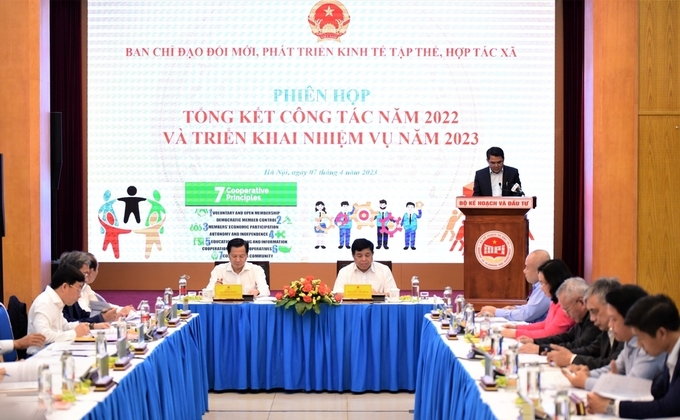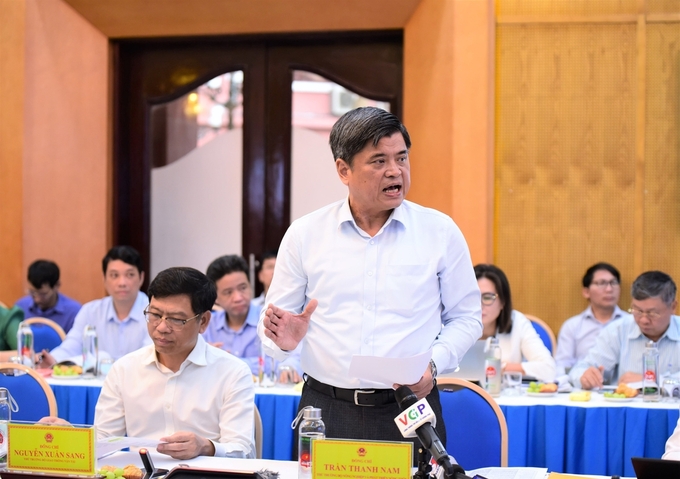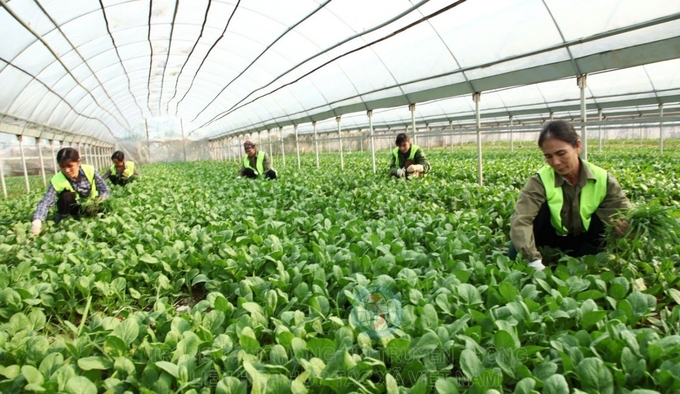May 21, 2025 | 23:01 GMT +7
May 21, 2025 | 23:01 GMT +7
Hotline: 0913.378.918
May 21, 2025 | 23:01 GMT +7
Hotline: 0913.378.918

Minister of Planning and Investment Nguyen Chi Dung said that support policies for cooperatives do not meet practical needs. Photo: Pham Hieu.
The Steering Committee for Innovation and Devlopment of Collective Economy and Cooperatives recently organized a meeting to evaluate the achieved results in 2022 and strategize tasks for 2023. According to Minister of Planning and Investment Nguyen Chi Dung, the development of Vietnam's collective economy had yet to meet the set targets and requirements.
"One primary reason for the limited development is that the collective economy and cooperative sector is heavily affected by the Covid-19 pandemic, along with other factors such as asmarket fluctuations, capital sources, assets, and slow digitalization. Mechanisms, policies and funding sources do not correspond with Vietnam's model of collective economy.
"The cooperative movement faces great difficulties and challenges upon the increasingly powerful development of the industrial revolution 4.0. The market economy is increasingly competitive, political instability is escalating. Climate change is becoming more radical, complicated and unpredictable. The process of industrialization and urbanization is occuring rapidly throughout the country," said Minister Nguyen Chi Dung.
As a central standing agency, the Steering Committee for innovation, collective and cooperative economic development is challenged in terms of human resource because most of its members work under multiple titles concurrently. In addition, most provinces and cities in Vietnam do not have an assistant department for the Steering Committee.

April 7 was the first time the Steering Committee held a meeting after the Covid-19 pandemic. Photo: Pham Hieu.
Vietnam aims to drastically implement various important solutions to the development of the collective economic sector in 2023. These strategies were set out under Resolution No. 20-NQ/TW dated June 16, 2022 by the 13th Party Central Committee as well as the Action Plan to implement Resolution No. 20 and Resolution No. 09/NQ-CP dated February 2, 2023 by the Government.q
The Ministry of Planning and Investment - the standing agency of the Steering Committee - proposes to appoint two deputy heads. The proposed candidates are the Head of the Central Economic Committee and Head of the Central Committee of Vietnam Fatherland Front. On the other hand, the Ministry will reinforce the role of the National and Provincial Steering Committee Office system to advise and assist the Steering Committee.
On behalf of the Ministry of Planning and Investment, Deputy Minister Do Thanh Trung proposed to compile and promote the top 300 model cooperatives annually. This list will serve as an inspiration for cooperatives across the country to improve their capacity and adapt to the increasing requirements of the market.
Mr. Trung requested the Ministry of Agriculture and Rural Development to direct and guide local governments in implementing projects such as: Pilot project to develop standard agro-forestry material areas for processing and consumtion from 2021 to 2025, Cooperative development to adapt to climate change in the Mekong Delta until 2025, with orientation towards 2030 and so on.
The development of cooperatives is also severely constrained by capital. As a result, Deputy Minister Trung suggested that the Ministry of Finance propose the Government and the National Assembly to reduce the corporate income tax on people's credit funds by 10%, exempt cooperative members from tax on capital gains.

Deputy Minister Tran Thanh Nam emphasizes the link between the development of cooperatives and raw material areas.
Deputy Minister Tran Thanh Nam reported that the Ministry of Agriculture and Rural Development aims to develop cooperatives in association with raw material areas and production chains. Some successful and effective models include: fruit production in Son La, coffee production in the Central Highlands, large timber forests in Quang Tri, Thua Thien Hue, and high-quality rice production in the Mekong Delta.
The Deputy Minister acknowledged that cooperatives face considerable competition from the business sector in the market economy. However, certain criteria such as revenue, scale, and profit are not entirely suitable to evaluate agricultural cooperatives.
"The output quantity may not accurately reflect the development of cooperatives. The agricultural sector guiding new cooperatives towards multi-services, value chains as well as improving quality, hygiene and food safety," Mr. Nam emphasized.
The Ministry of Agriculture and Rural Development has coordinated with the Ministry of Labour, Invalids and Social Affairs to develop and issue "vocational certificates" for directors of cooperatives. Deputy Minister Nam affirmed that this approach will help primary producers gain confidence as well as switch to an agricultural economy mindset.

There are nearly 30,000 cooperatives in Vietnam; two-thirds of which are agricultural cooperatives.
Mr. Nguyen Ngoc Bao, Chairman of the Vietnam Cooperative Alliance, was pleased to announce that the cooperation between cooperatives and cooperative groups, as well as the number of specialized cooperatives, have grown significantly over the years.
"After surveying multiple areas, we found that livestock production cooperatives have had a strong shift to green agriculture and circular agriculture. Many cooperative members have become more aware of their responsibilities in the economy and society," said Mr. Bao.
In addition to production organization, Mr. Bao suggested the Government, ministries, departments, branches and localities to focus on trade promotion activities, identifying Vietnam's development directions, especially in face of widespread urbanization.
Translated by Nguyen Hai Long
![Reducing emissions from rice fields: [2] Farmers’ commitment to the soil](https://t.ex-cdn.com/nongnghiepmoitruong.vn/608w/files/news/2025/05/05/dsc08881jpg-nongnghiep-140632.jpg)
(VAN) Clean rice cultivation model in Thuong Tan commune, Bac Tan Uyen district, is assisting local residents in achieving sustainable agriculture by substantially reducing costs, increasing productivity, and protecting the environment.

(VAN) At the conference to disseminate Resolution No. 68, AgriS introduced its digital agricultural ecosystem and reaffirmed its commitment to accompanying the Government in promoting private sector development and sustainable agriculture.

(VAN) 'Blue Ocean - Blue Foods' initiative is designed to restore marine ecosystems and establish sustainable livelihoods for local communities by cultivating a minimum of 1,000 hectares of cottonii seaweed in the first three years.
/2025/05/21/4642-3-112707_603.jpg)
(VAN) The V-SCOPE project has made direct contributions to three out of six pillars of the Comprehensive Strategic Partnership between Vietnam and Australia.

(VAN) Facing the threat of rabies spreading to the community, Gia Lai province urgently carries out measures to vaccinate dogs and cats on a large scale.

(VAN) Disease-free livestock farming not only protects livestock herds but also stabilizes production and livelihoods for many farmers in Tuyen Quang.

(VAN) Japan's grant aid project contributes to capacity building, promoting organic agricultural production, and fostering sustainable community development in Dong Thap province.